




Drum Major Christian Carroll leads The Pride of the Southland Band in its 155th year


JORDAN BEASLEY Contributor
EDITOR -IN-CHIEF: Bella Hughes
MANAGING EDITOR: Emma Love
COPY CHIEF: Caden Dyer
NEWS EDITOR: Shelby Wright
ARTS & CULTURE EDITOR: Emma Caskill
SPORTS EDITOR: Caleb Jarreau
ASSISTANT SPORTS EDITOR: Trevor McGee
OPINIONS EDITOR: Ansley Graves
PHOTO EDITOR: Erick Gomez-Villeda
DESIGN EDITOR: Ciara Chauncey
ENGAGEMENT EDITOR: Sarah Portanka
COVER PHOTO: Erin Tudryn
Lead photo: Drum major Christian Carroll leads the band during a game against Kent State at Neyland Stadium. Saturday, Sept. 14, 2024. Cambree Gliessner / The Daily Beacon
1-5: Pride of the Southland Band at Neyland Sadium. Sept. 14, 2024. Erin Tudryn / Contributor
ADVERTISING MANAGER: Cullen Askew
ADVERTISING REPRESENTATIVES: Jacob Stromatt
ADVERTISING PRODUCTION ARTISTS: Donatella Thomas
TO REPORT A NEWS ITEM OR SUBMIT A PRESS RELEASE, please email editorinchief@utdailybeacon.com or call (865) 974-2348
TO PLACE AN AD, please email admanager@utk.edu.
LETTERS POLICY: Letters to the Editor must be exclusive to The Daily Beacon and cannot have been submitted to or published by other media. Letters should not exceed 400 words and can be edited or shortened for space. Letters can also be edited for grammar and typographical errors, and Letters that contain excessive grammatical errors can be rejected for this reason. Anonymous Letters will not be published. Authors should include their full name, mailing address, city of residence, phone number and e-mail address for verification purposes. Letters submitted without this information will not be published. The preferred method to submit a Letter to the Editor is to email the Editor-in-Chief.
CORRECTIONS POLICY:It is the Daily Beacon’s policy to quickly correct any factual errors and clarify any potentially misleading information. Errors brought to our attention by readers or staff members will be corrected and printed on page two of our publication. To report an error please send as much information as possible about where and when the error occurred to managingeditor@ utdailybeacon.com, or call our newsroom at (865) 974-5206.
As part of a long-term plan to overhaul the city’s existing transportation systems, Knoxville Area Transit officially launched “KAT Reimagined” Aug. 26, adding new bus routes and removing others throughout the city.
The overhaul also focused on implementing more frequent service on routes, both during the work week and on weekends.
KAT states that KAT Reimagined aims to reduce congestion, improve accessibility and increase economic attractiveness. It is one step as the Knoxville Transportation Authority — the governing body of public transportation in Knoxville — continues to re-examine transportation in the city with partners like KAT and the community.
The revision did not change the coverage area of routes in general but instead focused on making routes more efficient and allowing passengers to get to their destinations more quickly.
KAT’s Director of Transit Isaac Thorne said that the plan has since proved “positive” according to some riders’ latest data and opinions.
“Customers they have talked to are liking the increased frequency, and a lot of them like the more consistent service seven days a week,” Thorne said.
Roughly four weeks after the launch of KAT Reimagined, there was a reported 11% increase in service use, compared to around the same time last year, according to Thorne.
However, Thorne notes that it is still very early, so KAT monitors rider usage to see the longer-term impact beyond initial rider numbers.
Alongside changes to the routes, their usage has almost certainly been bolstered by the increasing population in the surrounding area. Knoxville and the University of Tennessee have been experiencing steady population and tourism growth for the past few years.
According to the latest data from the U.S. Bureau of Population Estimates and Visit Knoxville, Knox County added 5,289 residents in 2023, and tourism saw an 8.8% increase from 2021 to 2022. UT has also brought thousands of additional students to campus over the last five years.
Surveys conducted last year also suggest that both populations will continue to grow.
“Another thing that I felt with this launch ... was the partnership with the University of Tennessee, allowing students to ride for free — a very positive response,” Thorne said.
The university’s growing student population and recent partnership with KAT have likely
impacted the use of the routes. The student population has recently jumped by 6.7% compared to last year.
According to Thorne, KAT’s internal data shows they currently see around 1,100 to 1,200 students every weekday. This is about 2.8% of the student population — or about 13.5% of the buses’ daily riders — based on the latest enrollment numbers and Q2 ridership numbers. However, these figures may increase due to the recent changes to parking at the university, which has stirred some commotion.
As a result of the population and visitation increases, improving transportation systems has become more of interest to legislators and a growing concern for local residents and students alike.
Madison Pollock, a UT graduate student studying social work who last rode the buses a year ago, recounts that one area for improvement could be their reliability and the accessibility of the replacement stops.
“There were times where I had to wait for a while. … But these past couple of months, I’ve been living on a street that has a stop on it, and I would say that is very consistent, so I think that it may just depend on where it is,” Pollock said.
Dependence on location could be problematic for some. However, KAT’s recent changes, aimed at addressing such issues, have hopefully worked to minimize the dependency and make service times more similar across all routes. Pollock highlights that “if people are relying on the buses for their primary form of transportation, then reliability is very important.”
The route changes removed many stops in lieu of others that were supposed to be in places that were busy and convenient for passengers to hop on. However, it is possible that for some stops, the busyness of the area was a stronger factor.
For example, Pollock recalls a family whose go-to stop was moved to the other side of a busy street but with little foot mobility in between. Although a central goal of the new changes is to add routes in busy areas, routes focused on this goal can conflict with KAT’s other goal of making routes easy to access.
This is a problem that many growing cities face, especially those that want to focus on efficiency, cost and ridership numbers.
KAT only operates bus transit lines, but other city planning organizations, such as the Transit Planning Organization, will need to continue working together to ensure that all facets of Knoxville’s transportation are accessible.
In 2021, KAT partnered with TPO to craft the long-term Mobility 2050 Plan, which included plans to fund 134 projects focused chiefly on improvements for motorist vehicles.
Regardless, KAT clarifies that they are still looking for other ways to improve public transportation. For example, they recently outlined an idea to eliminate cash payments for their buses and instead use a digital payment system.
KAT is hosting an event Sept. 26 that details these potential changes and others. It is open to the public and will allow people to voice their opinions.
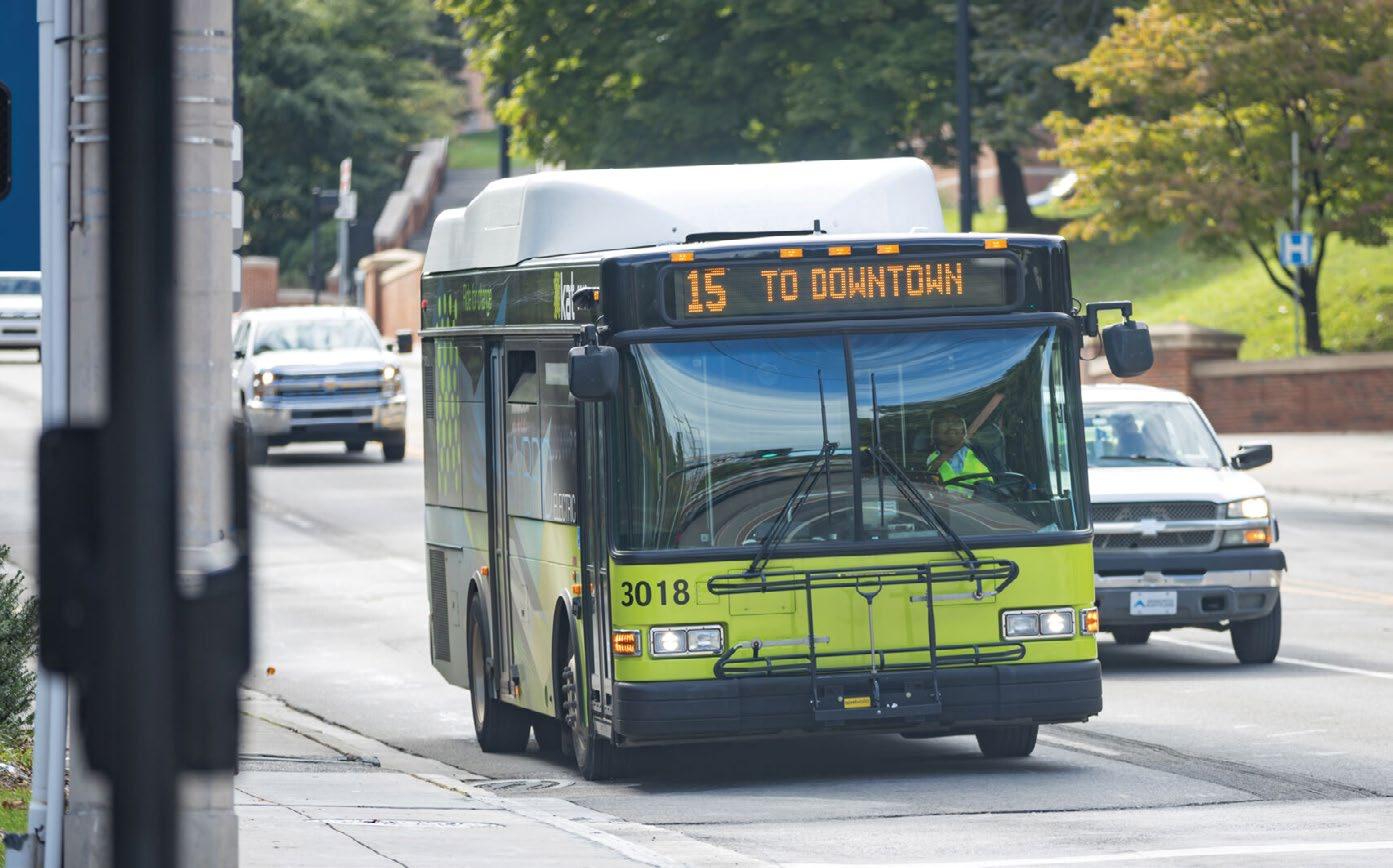
LOUIE PERRY Staff Writer
On Tuesday, Sept. 25, the Howard Baker School of Public Affairs and Public Policy partnered with the Haslam School of Business for the second discussion of the three-part series “Election 2024.”
Tuesday’s discussion brought the economy to the forefront in a moderated forum and debate, with the big question of the evening being, “Can the presidential candidates, former President Donald Trump and current Vice President Kamala Harris, each deliver the economic prosperity they promise?”
Marianne Wanamaker, dean and professor at the Baker School, opened the evening by sharing her goal for these discussion events.
“(Our goal) is to encourage this campus community and our neighbors in Knoxville to get informed, get engaged and vote in this election,” Wanamaker said.
Professor Monica Langley, an awardwinning 27-year veteran reporter for the Wall Street Journal and former tech vice president, hosted the forum debate.
She moderated a lively discussion with Michael Strain, director of economic policy studies at the American Enterprise Institute, who seemed to take a more conservative and classical liberal stance on policies. His counterpart, Matt Yglesias, an independent columnist whose writing focuses on economic policy and political pragmatism, took the more progressive side of the economic field.
The panel tackled five issues — inflation and housing prices, industrial policy and trade, taxes, immigration and the American Dream.
From 2020 to 2024, the Consumer Price Index — a tool that measures the prices of a basket of hundreds of goods and services bought by Americans — increased by 21.8%. This means that, on average, the prices of goods over the last four years have increased by around 21%. If you put it strictly in the price of food, Americans saw food prices rise close to 25% between 2020 and 2024, and just between 2023 and 2024, they rose 2.5%.
However, inflation, the hot button issue mentioned most during this election cycle, has decreased over the last four years. According to Strain, inflation is “the rate at which prices in the general economy are increasing.”
Inflation dropped from 9% to 3%, a healthy level for a prosperous economy. However, that doesn’t mean students
here on UT’s campus don’t feel a tangible upcharge in prices when they go to Target or Publix for their weekly grocery run.
Students, as well as their wallets and dining dollars accounts, would like to see price levels decrease and go back to the levels seen before the pandemic. Yglesias doesn’t see that happening.
“It is fair to say that some of President Biden’s economic policy choices are responsible for some of the price increases that we saw in the past. … But I don’t think that the Trump campaign has put forward a compelling strategy for making the price level drop — in part because nothing would accomplish that,” Yglesias said.
The panel shifted gears to affordable housing, a surging issue for Americans across the country and especially here on UT’s campus. However, the answers given by the two pundits were nothing hopeful.
“I don’t think either candidate has a good plan to deal with the price of renting an apartment or the price of buying a home. However, I think vice president Harris’ plan would actually make the problem worse,” Strain said.
He argued that Harris’ plan for a $25,000 tax credit to be used towards housing would not help the buyer but instead would help the sellers of homes. The seller would gain the benefit, not the people who obtain the $25,000.
It’s important to note that Harris did bring forward a plan, but Trump’s was not mentioned in the discussion nor has it been at the forefront of his messaging.
The next topic was industrial policy and trade. Strain highlighted his negative opinions on Trump’s plans for tariffs, a policy not usually associated with free trade and the Republican platform. Strain discussed Trump’s use of tariffs in his last administration, and Yglesias agreed with Strain’s disapproval of his tariff plan.
“This is a policy that was a lose for manufacturing workers, a lose for the agricultural sector and a lose for the American consumer,” Strain said.
However, it should be noted that the Biden-Harris administration kept some tariffs in place during their tenure.
Yglesias highlighted that Congress would like to extend Trump’s 2017 tax credit law, which will expire in 2025, but they don’t want to extend the cuts to other areas where Trump has been proposing. According to the panel, the tax cuts
proposed by Trump will cost $9 trillion, and the cuts proposed by Harris will cost $5 trillion. Strain believes these tax cuts will pass, specifically, “extending the tax cuts for the bottom 98% of households.”
This means those who make less than $400,000 will get those tax cuts — this is agreed upon by both teams.
The conversation got quite in-depth, but it emphasized Trump’s tax cut from 2017 and extending it for the future, as well as Harris’ plans for shifting what things are taxed, in order to sustain the middle and lower-class tax cuts.
Both pundits believe that neither candidate has a great tax proposal. The balance between who or what should be taxed and what the money should be used on will always play a part in tax cuts — there’s a winner and a loser. Once again, the idea of promises versus practical practice comes into play.
Both Strain and Yglesias agreed that economies flourish with immigration. However, they differed on the number of immigration and green cards that should be distributed. Each highlighted the work ethic and entrepreneurial spirit of immigrants in the economy.
Growing your economy comes in two ways, according to Strain.
“You can add workers, or you can make workers more productive, and it’s pretty tough to figure out how to make workers more productive,” Strain said.
The consensus — America needs
immigration to build the economy. The question is, how much?
Final Thoughts
Langley asked both pundits which candidate has the best plan. She was looking for a straightforward answer, as many students are today.
“I don’t think we really know what to expect,” Strain said. “I think President Biden really did engage in the most reckless and irresponsible fiscal policy in decades, and Vice President Harris was a part of that administration. … I think President Trump’s stewardship of the economy while he was president was a mixed record. A lot of what he did was good. … But a lot of things he did were really bad.”
It was an unclear, mixed response that seemed to emphasize Trump’s vision, even if he does disagree with many of these platform pieces. However, Strain did note some good things that Trump did in the past and that Trump seems to want to roll them back in his next administration.
“I’ll make the case for Vice President Harris,” Yglesias said, while still not entirely confident. than today.”
His message and hope that the American Dream is still alive is encouraging — yet many students who see the state of the economy may disagree. However, the question remains whether the policies brought forward by Trump or by Harris can bring back that spirit and hope that the American Dream embodies.



HARRISON ING Contributor
The Latin American Student Organization and the Office of Multicultural Student Life opened the doors of the Frieson Black Cultural Center Thursday Sept. 26 for all UT students to enjoy free food, photo opportunities and dancing. The event commemorated Hispanic Heritage Month, which started Sept. 15 and runs through Oct. 15.
At the event, tacos with various grilled meats and toppings were served along tables, music from various Latin American artists was playing and entrants engaged with friends and strangers. A photo wall was set up for groups to enjoy, and people were seated around tables to enjoy the food or move about to learn some of the cultural practices central to Hispanic Heritage Month.
Amy Gonzalez, a senior studying sustainability and the president of LASO, said that the event is mainly focused on getting Hispanic Heritage Month started with a noticeable marker. She said that bringing students together over Latin cultures can be an illuminating and bonding experience for students of all backgrounds.
“At its core, we’re celebrating the importance of Hispanic Heritage Month, and this is open to anyone — people who are Hispanic, but also anyone who is interested and wants to engage with the culture,” Gonzalez said. “We want to provide a space for people of all backgrounds to enjoy Latin American culture.”
Edwin Rosales Rodriguez, a sophomore studying chemistry and the vice president of LASO, also said that the community aspect of the event is key. He said that it has been an important part of his own experience with LASO, and he wishes to provide that for others.
“When I came to UT I didn’t expect to find that community, and when I joined LASO I saw all these people that had the same backgrounds and challenges as me.” Rosales Rodriguez said. “That sort of helped me find my people in a new place, and I want to be able to provide that for someone else.”
Rosales Rodriguez said that the organization changed him from the somewhat introverted and shy person he was in high school into the more outgoing person he is today. Now, he said the organization has evolved past being just an organization for him — it has become
like a family.
Gonzalez said finding that family can be particularly important to those who are first generation students. In an area where many Latin American customs are misunderstood or misrepresented, having a campus like UT that has been more accepting means a brighter future.
“Campus is more welcoming and accepting of different cultures I feel like because people are interested in them and want to learn about them,” Gonzalez said. “That’s why it’s important we provide a space and event like this to give them that chance.”
Keanu Herrera, a senior studying mechanical engineering, was an entrant at Vol Avenida who had been to many LASO events in the past. He said that LASO is great for how it looks toward the future of UT and works to provide a framework of acceptance and belonging.
“I definitely feel like the Hispanic community here at UT is growing, and that’s definitely something I like to see,” Herrera said. “It’s definitely a comforting feeling to come out and find people with the same experiences culturally and to be able to relate.”
Gonzalez said that the event came together much like she had hoped it would and that looking at it and LASO has been like watching her child grow up. Out of everything, she said her favorite parts is just seeing the reactions of people that attend.
“I really just want to see people walking away with smiles on their faces and
“I definitely feel like the Hispanic community here at UT is growing.”
Keanu Herrera Senior, mechanical engineering
ARNASHIA GRAY Contributor
On March 21, 2024, Governor Bill Lee signed into legislation the Ensuring Likeness Voice and Image Security Act. The act adds more layers to Tennessee’s pre-existing Protection of Personal Rights Act of 1984 to accommodate the usage of new technologies like artificial intelligence.
The ELVIS Act is the first piece of legislation to add the misuse of voice in regards to AI. This new addition makes Tennessee the first state to enact this kind of law. The ELVIS Act is composed of two parts that add to its pre-existing legislation.
The first is the expansion of section 47-25 1105 which prohibits the “unauthorized commercial use of an individual’s voice, in addition to the existing restriction on use of an individual’s name, photograph and likeness.”
One issue that has risen from the use of AI include plagiarism. AI makes the process of generating similar sounds of artists easier and more accessible. “Some have used it to generate fake songs using someone else’s likeness, while others copy musicians’ styles and present them as their own,” Hailey Miller, staff writer for The Peak, writes in her article “AI is harmful for musicians.”
An example of this occurred in January 2023 when Australian musician and writer Nick Cave responded to a fan who sent him lyrics written in his style created through ChatGPT. Cave responded by dedicating an issue of his Red Hand Flies newsletter to the fan’s AI lyrics, where he described the lyrics as a “grotesque mockery.”
While the rise of AI is generally seen as a threat to the future of music, there have also been positive examples of AI usage. In 2013, country music star Randy Travis suffered a stroke which prevented him from being able to produce new music. However in May 2024, Travis released “Where That Came From,” a song created with the aid of AI to recreate the singer’s voice. The song debuted on the Billboard charts and portrays legal and ethical use of artificial intelligence.
Sam McGuire, a senior at UT, talks about what he believes AI usage within the music industry does.
“Overall, I think unethical AI use threatens artists’ ability to protect their historical works and could threaten the success of future works in the marketplace because AI can produce music a

thousand times faster than humans,” McGuire said.
But in the case of ethical and legal AI usage like “Where That Came From,” McGuire had a different opinion.
“I’m all for it because it’s actually a good song, Randy Travis had a part in the decision-making process and he was alive,” McGuire said.
This situation opens up a door for more conversations about the use of AI in regards to the works of deceased artists and their protections. AI can have positive impacts, but there is a point where ethics comes into question where the recreation of an individual’s voice and likeness is concerned.
The second expansion of the pre-existing Protection of Personal Rights law is more clearly defined forms of civil liability.
An individual can be held liable if they knowingly use or infringe upon the use
of an individual’s name, photograph voice or likeness for purposes such as advertising, products, merchandise, goods or services etc., without prior consent.
One can also be liable to civil action if they knowingly publish, perform, distribute, transmit or make an individual’s voice or likeness available to the public without prior consent.
The final addition to the new forms of civil liability an individual can face is if they knowingly distribute, transmit or make available software, tools or other technology where the primary purpose is to aid in the production of an individual’s photograph, voice or likeness without prior consent.
The creation of art forms like music, traditional art and literature are elements of humanity that have existed long before the creation of AI. Many feel that the continuous rise of technologies
like AI threaten the integrity of musicians, writers, industry professionals and their art forms as well as self-expression.
David Razura, a junior at UT, discusses the negative traits AI has on artists.
“We shouldn’t give AI any power over music or art of any kind because if we do then we’ll lose one of the most important things that art gives us — human connection,” Razura said.
The future of the relationship between AI and music is still unwritten, but the current impacts are undeniable. For better or for worse, AI is making its mark in the industry. However, with regulatory acts like the ELVIS Act, there are actions being taken to protect artists against the potential threats placed upon them from new technologies.
How Pride of the Southland Band drum majors continue to tune the soundtrack of the UT experience.
BELLA HUGHES Editor-in-Chief
Legacy means everything. For The Pride of the Southland Band, their legacy is hard work, dedication and amplifying the energy fans bring into Neyland Stadium.
Originating in 1869 as an offset of the military department, The Pride didn’t take full force in Neyland Stadium until the 1920’s. Since then, the band has taken its true form becoming a staple in campus culture and a cornerstone of UT history.
The drum major sets the tone — both literally and figuratively —- by acting as a
liaison between the director and the band, keeping tempo of the music, and being an overall leader and figurehead for the team.
This year, the Pride is celebrating 155 years of music and current drum major and music education major, Christain Carroll, took on this role with humility as he continues to carry on the program’s rich legacy.
“This is Pride 155,” Carroll said. “This band is rich and rooted in culture. It knows exactly what it wants from its members … it’s going to have very high expectactions for leadership. Knowing a program like that wanted me to stand in front of it and lead the band is the most humbling and flattering thing that has ever happened to me.”

The Pride of the Southland Band has grown in popularity amongst the UT community and in prospective bandmates. The Pride had an anticipated 550-person roster if it were to allow all returning members and new auditionees. To combat the influx in membership, they held reaudtions for returning members.
During spring 2024, Carroll sent in his application and was then selected as a finalist to audition. With the new audition routine in mind, he felt “a bit more pressure,” but used those feelings as motivation. After auditions, the directors and remainder of the band elected Carroll to take reign as drum major for the 2024-25 athletic season.
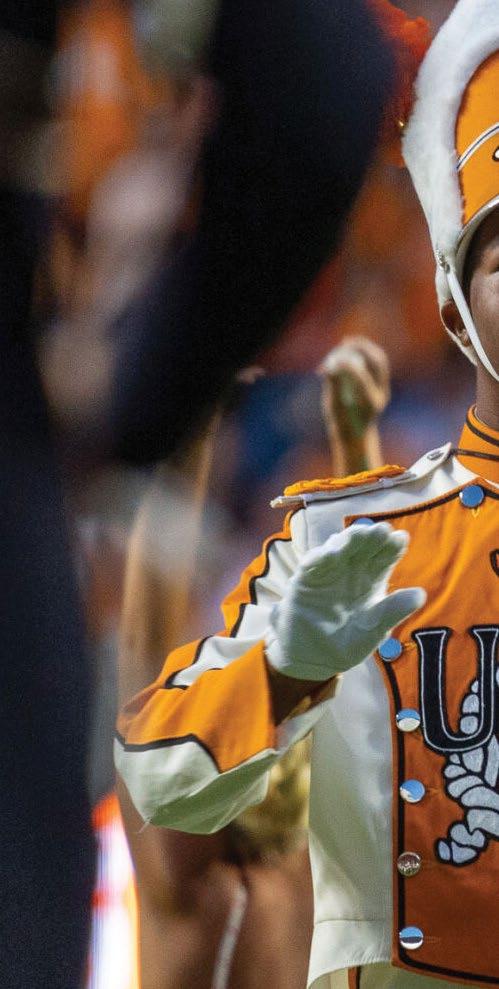
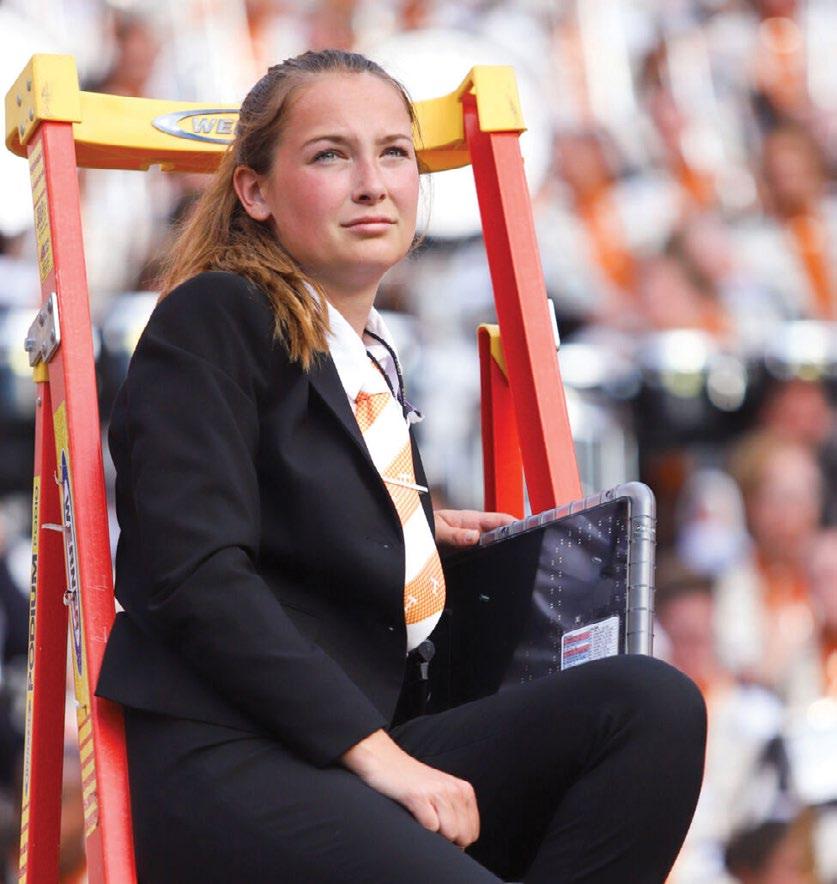
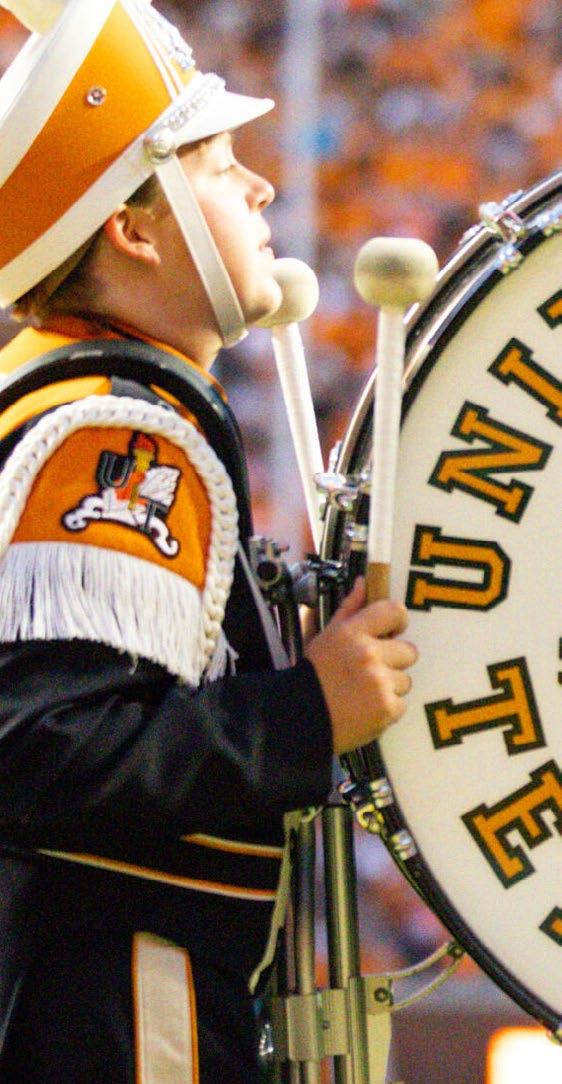
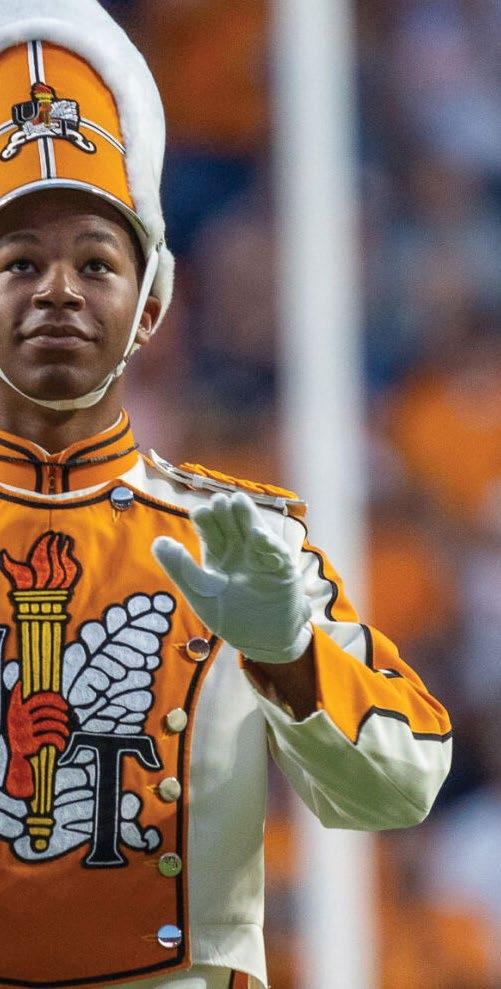

As The Pride becomes more competitive, the talent grows in expectation. Reauditions allowed the group to find members that would continue to elevate the program’s prestige and heighten the student experience.
“With these reauditions and with so many talented players coming in, it really ups the level that we are expecting of our members,” Carroll said. We are getting some of the best people in the nation to try and be a part of this band. Because that is happening, it makes it so our expectations need to raise with the quality of our members.”
Although The Pride sets the soundtrack to the UT experience, the members set a soundtrack of their own.
Assistant drum major and music education major, Sydney Flenniken, uses her role in a unique light by leveraging her duty as a black suit — a teaching role within the band — to immerse herself in her academic studies.
“It’s providing me and all the other black suits — who are also music education majors — a big opportunity to be able to put ourselves in these shoes before we actually have to go out into the field and start doing it. Flenniken said. “It’s an incredible opportunity I know not a lot of universities provide.”
Flenniken jokingly refers to the black suits as the “CIA agents that sit next to the band” — which isn’t far from the truth. Black suits act as tecahers during rehearsal and security on a game day picking up lost insruments while they lead The Pride to
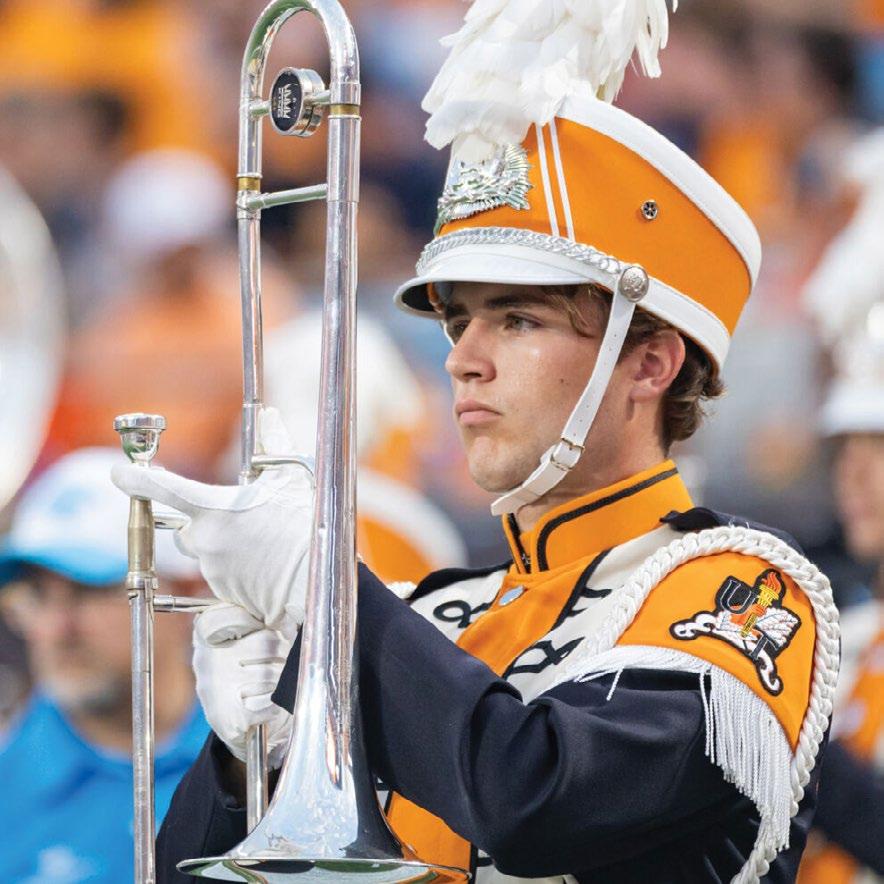
Neyland Stadium.
“We basically are like security walking down to the stadium,” said Flenniken. “If anything gets dropped, we pick it up. We communicate what’s going to happen in the parade block … when we cross the bridge across the Student Union, we’ll go into continuous “Rocky Top” and give the signal for that.”
These signals play a huge role in protecting the communication between drum major and assistant drum major.
Flenniken and Carroll both started in The Pride in 2022 and have “grown up together” during their time in The Pride. They attribute a great deal of their successful teamwork to their streamlined communication.
“The fact that I get to have someone that I wholeheartedly trust and respect, just because of how amazing she is at literally everything she does makes it so that I’ve never really have to worry about our team dynamic,” Carroll said. She has everything she needs to under control and that gives me the liberty to focus on myself and the band. She makes my job very easy in comparison to what it would be without her.”
This partnership is as outward facing in communication as it is internally. During a football game, Flenniken acts as the eyes of the operation sending messages to Carroll at the top of the ladder in between downs and when the Vols are on defense — she even created a secret code to better signal to Carroll during the rush of a performace.
“I’ll put my hand on his ladder or the back of his leg, to show him, ‘Hey, we’re gonna stop soon,’” Flenniken said. “Then (when) I
start hitting his leg — that’s when we cut off and we stop playing.
If we ever just need to stop immediately, I just start smacking his ladder super hard, and he stops immediately.”
As the frontman of the band, Carroll depends on those around him to help form the group dynamic, often listening to the reactions of his bandmates or connecting with them on a personal level during practices and performances.
Carroll credits is mom for teaching him how to be an effective leader.
“She tells me all the time, ‘You don’t just communicate to people, you need to communicate for people,’” Carroll said. The only way to learn how to communicate for and to people is to understand and get to know those people.”
In an attempt to form relationships with his team — old and new — he takes a wholistic approach by interacting with teammates during water breaks and rest periods. Interacting on a human-level helps him make well informed decisions on the ladder.
Growing up surrounded by music can be uplifting or exhausting depending on one’s outlook. For Carroll, he pushes past the apathy and uses his passion for music to fuel inspiration.
“The reason long-term why I am doing this is because I feel called to impact lives through music,” Carroll said. “That is really pushing me through all of this music I am experiencing. I know at the end of all of this, I am improving lives.”
As the Vols approach a list of SEC match-
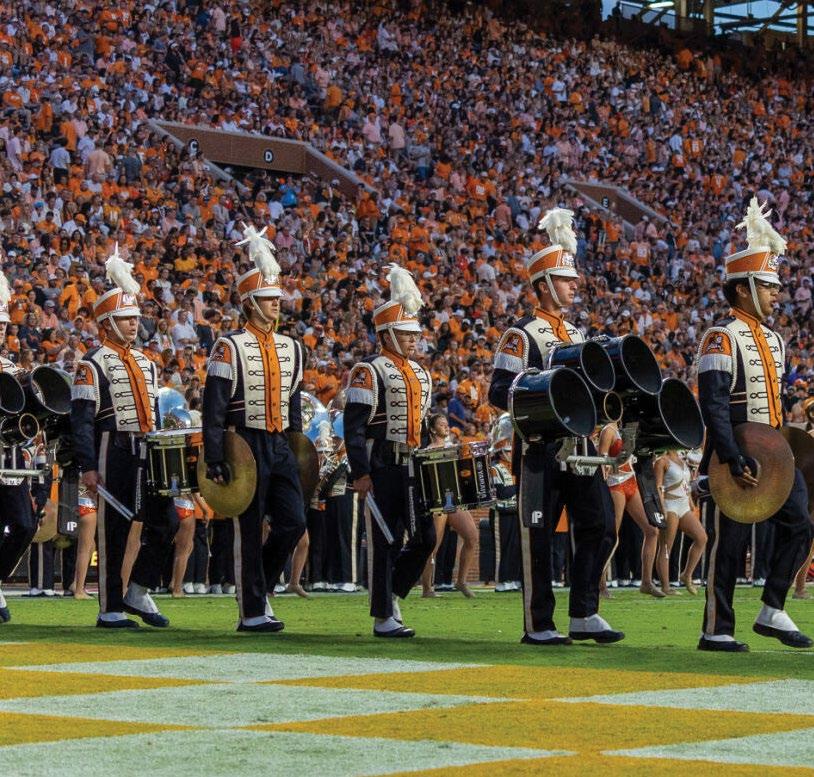
SAMANTHA WHITLEY Staff Writer
On Sept. 23, Rocky Top Recovery hosted their ‘Planting the Seed’ event outside of the Humanities and Social Sciences Building. At this event, students could select a free, small plant by signing in with their Vol Card. They also enjoyed painting their pots, allowing them to personalize their new plants.
“We want to plant the idea that living a recovery lifestyle is encouraged on our campus. Rocky Top Recovery hopes (that) the more we talk about mental health, the less stigma will exist around it.”

According to Rocky Top Recovery’s online page, their main mission is to help students deal with mental health challenges and substance use by establishing a community and promoting awareness for students wanting to recover.
Rocky Top Recovery works alongside the Center for Health Education and Wellness to achieve this goal.
Nicole Wiggs is the collegiate recovery program coordinator for the University of Tennessee, where she works with students through Rocky Top Recovery. Wiggs spoke on how the two programs work together.
“Rocky Top Recovery is housed in CHEW and uses the ‘Vols Help Vols’ commitment, which is a core piece of CHEW’s mission,” Wiggs said.
Mental health is not an easy subject to talk about. Many misconceptions exist, making it difficult to address the topic effectively.
Students who are not going through a challenging time may not fully understand the impact of living with a mental health disorder. Additionally, stereotypes and misinformation can create barriers that discourage
individuals from seeking help.
Each plant at this event had a note in the soil reminding students that “the opposite of addiction is connection.”
This reinforces the idea that not communicating about mental health with trusted peers increases the stigma.
“We want to plant the idea that living a recovery lifestyle is encouraged on our campus,” Wiggs said. “Rocky Top Recovery hopes (that) the more we talk about mental health, the less stigma will exist around it.”
The ambassadors of Rocky Top Recovery are dedicated to making students feel more comfortable about their well-being while on a college campus.
One ambassador of Rocky Top Recovery is Vanessa Betancourt, a second-year doctorate of nursing practice student who studies psychiatric mental health. Betancourt spoke on how to make mental health a nonjudgmental subject.
“Some ways that we can decrease stigma is by demystifying mental health through open conversations, educating students through Recovery Ally training and offering peer support groups that welcome all pathways of recovery,” Betancourt said.
The word ‘recovery’ can sound daunting for those facing mental challenges and seek-
“It takes strength to ask for help, but strength is not defined by being unbreakable.”
Vanessa Betancourt Rocky Top Recovery Ambassador
recovery needs.
Some of these include welcoming hangouts, meetings for eating disorders and resilient mind meetings. There are also all-recovery meetings that focus on addiction. Most of these gatherings are in the heart of campus, John C. Hodges Library, giving students easy access to help. There is also a Zoom option for those who are unable to meet on campus.
Rocky Top Recovery encourages students to get help, acknowledging that it is easier said than done.
“You can reach out to a Rocky Top Recovery ambassador @rockytoprecovery on Instagram, consider making a list of things you want your recovery support to include, try out a Rocky Top Recovery support meeting or attend a Rocky Top Recovery community event,” Betancourt said.
It’s essential to check in not just with yourself but also with your friends and family. While everyone’s healing journey is different, there are common signs that may suggest someone is struggling.
ing support. However, Rocky Top Recovery eases those concerns by hosting safe, inviting events each week that cover a variety of
Some of these cues include major mood swings, lack of motivation, isolation, and changes in appetite and sleep.
“You are not alone in your struggles, and there is hope for you,” Betancourt said. “It takes strength to ask for help, but strength is

JACH CHURCH Senior Staff Writer
Over the summer, Craig Snider got a call from Tennessee softball head coach Karen Weekly.
With Chris and Kate Malveaux having departed to become co-head coaches at Auburn, Tennessee was in need of a hitting coach. With his pedigree, Snider was the perfect fit for the job.
The job was also a perfect fit for Snider, who jumped at the opportunity.
“When we get that call from Karen, it’s one of those no-brainers,” Snider said. “It’s a top-five program in the SEC and competing for national championships every year.”
Snider spent nine years as the hitting coach on Lonni Alameda’s staff at Florida State. The Seminoles made three Women’s College World Series appearances during Snider’s tenure, winning the national championship in 2018.
Snider brings his own approach to the plate. Although he is good friends with Chris Malveaux, his method of coaching is different. That’s something the Lady Vols are still getting used to during the fall season.
“We’re just trying to really work on approach right now,” Snider said. “Try to get a good pitch so we can hit and try to sell out for certain things.”
Over the past two seasons, Tennessee’s strength was the long ball. The Lady Vols hit 84 home runs last season and hit the most home runs per game in the SEC.
While Tennessee’s offense was very effective, it struggled when home runs weren’t flying out of Sherri Parker Lee Stadium. That’s something Snider will try to address as he seeks to diversify the offense.
“I just like his approach,” Weekly said. “It’s a really versatile approach. He wants to get runners in motion and use all aspects of your offense — bunts and slaps and hit and run and everything.”
Tennessee’s lack of a consistent offense proved most costly in the NCAA Tournament last season. In the super regional against Alabama, the Lady Vols scored just six runs in 27 innings of offense.
After the way last season ended, Tennessee’s offense was in need of something new. Snider looks to provide that this season.
“I think just his philosophy is something that we absolutely need after last year,”
Tennessee infielder McKenna Gibson said. “Just kind of resetting, having somebody new. … He talks a lot about our mentality at the plate and just our mindset. So just focusing a little bit more on that I think will just be very beneficial for our team.”
Alongside Snider, Tennessee also welcomed Stephanie Sanders to its staff. Snider and Sanders got married in June and will continue a 24-season run of Tennessee having a couple on staff.
Sanders fills Kate Malveaux’s role and will primarily coach Tennessee’s catchers and outfielders. When Weekly was looking for an assistant coach, she appreciated how well she interacted with those around her.
“Every coach she’s worked for just raved about her,” Weekly said. “Just nothing but good things to say about her abilities as a coach, her abilities to connect with people, both the players in the program as well as staff members.”
On Saturday and Sunday, Snider and Sanders coached in a game setting for the first time together as Tennessee began its fall season. The Lady Vols dominated in games against Georgia Tech, Lipscomb and Walters State.
Snider’s offense scored 33 runs in three fall games, starting off on the right foot.
He continues connecting with players, something he does in practice as well.
“Craig is a great communicator, and I think that’s already been something our hitters just really enjoy,” Weekly said. “I like the way he’s consistently talking to them about their approach and what they’re looking to hit.”
“I think just his philosophy is something that we absolutely need after last year.”
MCKENNA GIBSON Infielder, Tennessee Softball
JACK CHURCH
Senior Staff Writer
Sammi Woods and Mac Midgley started their friendship with a win.
Both playing for the Michigan Hawks Soccer Club, Midgley got called up from the U10 team to play on the U11 squad alongside Woods in the State Cup — the most important tournament of the year. The Hawks won that tournament, kicking off the intertwined stories of Woods and Midgley on the pitch.
Three years later, Midgley and Woods played on the same team within the Hawks for the full season, and their friendship fostered from there.
“It didn’t take a lot,” Woods said. “I think we were just very similar in the way we played and the way we approached soccer.”
Both Woods and Midgley play as attacking midfielders and complement each other’s styles. While Woods created her own chances more often, Midgley excelled at setting up her forwards. The two were a perfect match for each other on the field.
Going separate ways
Woods and Midgley played together all through their childhood until it was time to go to college. Woods chose to stay close to home and attend Michigan, less than 10 miles from her hometown of Saline.
“It was a really nice balance of academics and athletics,” Woods said. “I found a really great group of people and had a great career soccer-wise, so everything worked out well.”
In four seasons with the Wolverines, Woods appeared in 72 matches, starting 48 of them. She scored 24 goals and led Michigan with eight goals in her senior season last year.
While playing college soccer, Woods earned a psychology degree from Michigan. She was an Academic All-Big Ten selection twice and was named a Big Ten Distinguished Scholar in 2023.
Playing for Michigan, Woods helped knock Tennessee out of the 2021 NCAA Tournament with a 3-0 win. Woods scored the third goal in the game, the only time she has scored in the NCAA Tournament.
While Woods was having all of her success, Midgley wasn’t there, still playing club soccer without her teammate and best friend.
“I was a mess,” Midgley said. “I was crying all summer.”
Two years after Woods began her college career in Ann Arbor, Midgley transitioned to the college game. She chose to play for Tennessee and Brian Pensky, who was the head coach during her recruitment.
At Tennessee, support from both the fanbase and the athletic department shows up in more than just football. When Midgley was considering her options, Tennessee’s investment in soccer stood out compared to its peers.

“The support that they have around sports, I mean, nowhere else compares,” Midgley said. “Everyone comes to games. You feel the support.”
Ultimately, Midgley made the decision that was best for her, however hard it may have been to forge her own path. Instead of moving less than 10 miles from her home like Woods, Midgley headed over 500 miles from her home in Wolverine Lake, Michigan to wear orange.
While the opportunity to stay home and rejoin Woods was hard to pass up, it was the right decision.
“A big reason why I wanted to go to Michigan was to play with Sammi, and it’s close to home and all that,” Midgley said. “But I decided I wanted to go further and out of state. … It was hard to say ‘no’ and say ‘bye’ to Sammi.”
When Kirt took over as the head coach following Pensky’s departure, Midgley stayed and bought into his mission. Kirt continued to build Tennessee’s culture, just as he did as an assistant coach for 15 seasons.
He picked right up from where Pensky left off in that aspect, making sure Tennessee’s players still had strong bonds with one another. Midgley noticed Tennessee’s culture during her freshman season, and it hasn’t wavered since.
“This is the closest team I’ve ever been on,” Midgley said. “It is like a second family, and I think you don’t get that everywhere. … You spend all your time with the soccer girls.”
For four seasons, Woods and Midgley played without each other. When Woods got a fifth year of eligibility due to the shortened 2020 season, the opportunity came for the two to share a field again.
Reuniting in Knoxville
For Woods, being a part of the Lady Vols wasn’t the only factor in coming to Knoxville.
As a member of UT’s graduate program in sports psychology, she found a place where her academic needs align with her athletic
goals.
Of course, Midgley being involved in the program was a major reason to come to Tennessee. In their everyday conversations, Midgley sold Woods on the benefits of the Lady Vol soccer program.
“We talk every single day,” Woods said. “We keep up with each other. So just from the good things she said, from a soccer and a social standpoint, I was really excited.”
Outside of their friendship, Woods was the type of player the Lady Vols needed. With Jordan Fusco leaving for Penn State, Tennessee needed an attacking midfielder in its line — one who could both run play through her and score herself.
Kirt knew of Woods’ impact on the game, having seen how it contributed to the end of his season in 2021. When he got the chance to talk to Woods, he bought in.
“Mac was our mutual thing that tied us together, but that was more just getting to know each other, like who I was, who he
was,” Woods said. “I think a lot of what I wanted aligned with what he does here as a coach and as a program. So I did really like that from the get-go.”
Woods’ presence is already paying off for Tennessee. She has scored four goals in her first nine games, including the winner against Ole Miss to open conference play.
Midgley is also enjoying a strong start to the season. She has scored two goals, scoring the only goal in a 1-0 win over Memphis, Tennessee’s best win of Kirt’s tenure as head coach.
As Woods is still building into Tennessee’s system, her relationship with Midgley has helped her find her place.
“They both see the game similarly,” Kirt said. “I think Sammi getting more and more familiar within our system and how she can find the ball and get on the ball without losing her identity as a player. … I think all that helps make it a relatively seamless partnership for them on the field.”
Through Tennessee’s non-conference slate, Woods continued her development as a player within the Lady Vols structure. Now with conference play underway, Woods has fully acclimated to Tennessee’s system alongside several other transfers such as Sarah Bridenstine, who also came from Michigan.
When Woods and Midgley started their time playing together, they won their first tournament. In possibly their last season doing so as the pair are eyeing an SEC Tournament win, something Tennessee hasn’t done since the season before Midgley got to Knoxville.
“I’m just so focused on team goals right now and team wins,” Midgley said. “What do we need to do collectively? That trumps everything.”

Contributor
Football takes center stage this week as Tennessee hits the road to face the Arkansas Razorbacks before their monthlong homestand. Students looking to rack up “T-Credits” will have one chance to do so before the ticket lottery for the Florida game next week.
Oct. 4: Women’s tennis at the Women of Troy Invitational
The women’s tennis team is heading west to the City of Angels this week for a showdown with Southern California. Elza Tomase has been lights-out for Tennessee, making history by becoming the first Lady Vol to reach the singles title match at the ITA All-American Championship. Although she lost, she secured herself a spot in the NCAA Individual Championships later this season.
Oct. 4: Soccer vs. Missouri – 1 “TCredit” opportunity
Soccer continues SEC play, hosting the Missouri Tigers at Regal Stadium on Friday night. Tennessee holds a strong 9-2-1 record against the Tigers and is currently on a four-game win streak. Despite a 3-6-1 overall record and 1-21 in SEC play, the Tigers have started to wake up. In their last two matches, they tied with Alabama and beat Florida. The Lady Vols will need a quick start to control this game.
Oct. 4: Volleyball at Ole Miss
The Lady Vols (8-4) are seeking a win over Ole Miss (10-3) after both teams suffered SEC setbacks last week. Tennessee fell to Oklahoma in four sets while Ole Miss got swept by Arkansas. The stakes are high in this one, with the Rebels searching for their first SEC win of the 2024 season. Historically, the Lady Vols have been dominant in this matchup, winning 50 of their 61 matchups. Tennessee is also riding a five-game win streak over Ole Miss.
Oct. 5: Softball vs Kentucky
Softball will continue its fall slate after looking strong in their first three outings, scoring a combined 33 runs. Kentucky will be the Lady Vols’ biggest challenge of the fall, and they will face them again on Oct. 20 in Lexington for the fall finale. This matchup will be beneficial for both teams, and great for getting looks at younger players.
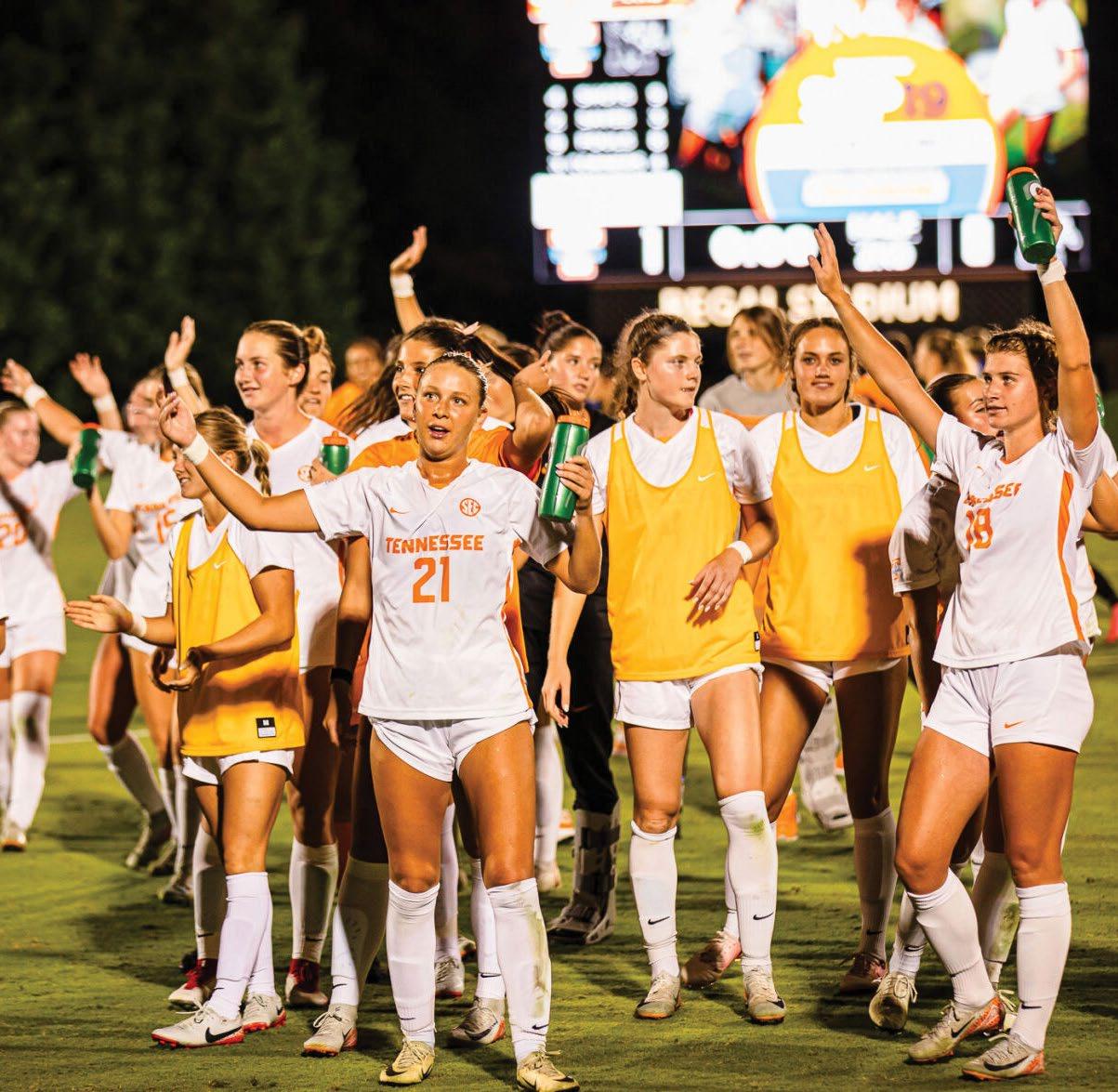
Oct. 5: Football at Arkansas
One of the most anticipated games of the week comes Saturday night when the No. 4 Vols (4-0, 1-0 SEC) travel to Fayetteville to take on the Razorbacks (3-2, 1-1). The Vols enter as a 14-point favorite. The Razorbacks are coming off a 4-point loss to Texas A&M, while the Vols had a bye week.
Tennessee and Arkansas haven’t met in four years, when the Razorbacks claimed a 24-13 victory in 2020. Tennessee is 13-6 all-time against Arkansas, but
they are on a three-game skid. The Vols look to end that streak and tally another win in their 2024 campaign.
6:
The men’s golf team will travel to South Bend to compete in the Fighting Irish Classic. In the Valero Collegiate Tournament, Tennessee finished in the middle of the pack as a team, placing eighth of the 15 teams. Lance Simpson and Evan Woosley-Reed had impressive
performances, both are tied for fifth place overall after shooting six under par.
Oct. 6: Volleyball at Mississippi State
The volleyball team will only have to drive about an hour and a half southeast for their next opponent after facing Ole Miss the previous Friday. The Bulldogs (7-3, 1-0 SEC) are on a roll, picking up six consecutive wins after starting the season 1-3. The Lady Vols have dominated the Bulldogs, winning 54 of the 69 matchups, and they have a four-game
TYLER EDMANDS
Contributor
No. 4 Tennessee football is rested and ready for another SEC game. This week, its hits the road to face the Arkansas Razorbacks in Fayetteville. Although Tennessee is a clear-cut favorite, here are some players who could pose a challenge to the Vols.
Taylen Green, a redshirt junior and Boise State transfer, has quickly become the Razorbacks’ go-to signal caller. After starting 12 games last year with the Broncos, Green brought his dual-threat ability east to Fayetteville where he became a staple of the Razorbacks’ offense. During his past two years at Boise State, Green threw for 3,794 yards and 25 touchdowns while adding 1,022 yards and 19 scores with his legs.
Green has been solid this year, completing just over 54% of his passes for 1,236 yards, five touchdowns and five interceptions. He is Arkansas’ second-leading rusher, totaling 331 yards and four scores.
After a close loss to Texas A&M last week, the Razorbacks are placing emphasis on their quarterback.
“I think to take the pressure off of the offensive line and our quarterback, we have to run the ball a bit more,” Arkansas head coach Sam Pittman said. “Get the ball out of his hands so we can build some trust between him and the offensive line. He’s got to get better, and the offensive line’s got to get better.”
This improvement will be tested Saturday night as the Razorbacks face one of the top defensive fronts in college football.
Wide receiver Andrew Armstrong
Wide receiver Andrew Armstrong will pose a significant challenge this week as he goes
against the Tennessee secondary. Armstrong, a second-year Razorback and a Biletnikoff Award watchlist member, has made an impact since he got to Fayetteville.
In his inaugural season as a Razorback, Armstrong started all 12 games. He led the team in receptions with 56, receiving yards with 764 and touchdowns with five — establishing himself as a key contributor for Arkansas.
This season, Armstrong has continued to be a go-to target, totaling 29 catches for 420 yards. Although he’s moved Arkansas’ offense, he has yet to find the end zone in the 2024 season.
Arkansas is expected to take a more balanced approach this week, but they will still rely on Armstrong to move the chains through the passing game.
Linebacker Xavian Sorey Jr.
Linebacker Xavian Sorey Jr. will pose a complicated test for the Vols’ offense. The redshirt junior is no stranger to SEC competition since he spent the first three years of his career with the Georgia Bulldogs.
After starting two games for the Bulldogs and appearing in another nine, Sorey needed a fresh start and more playing time.
He headed for Arkansas, looking for a bigger opportunity to play. This season, he’s started all five games for the Razorbacks, leading the team with 32 total tackles.
Sorey has been an anchor for the Razorbacks this year, stepping up as a leader after four of their linebackers transferred in the offseason.
This week, Sorey’s leadership and skill will be challenged when Arkansas is matched up against the SEC-leading Vols’ run game, led by Dylan Sampson. Containing Tennessee’s run game will be one of the toughest tasks of the season so far and an important factor in deciding the outcome of the game.

TENNESSEE 35 AT ARKANSAS 21
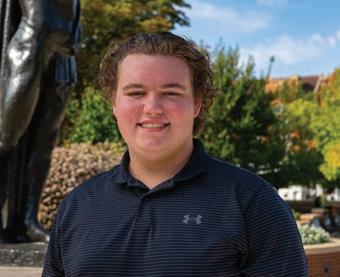



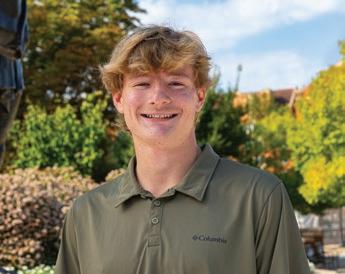

36 AT ARKANSAS 23
at TEXAS A&M NAVY AT AIR FORCE SMU AT LOUISVILLE
OLE MISS AT SOUTH CAROLINA
MICHIGAN AT WASHINGTON
MIAMI AT CAL
TENNESSEE 42 AT ARKANSAS 10
at TEXAS A&M
TENNESSEE 36 AT ARKANSAS 24
TENNESSEE 49 AT ARKANSAS 27